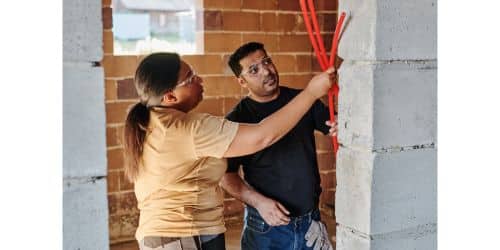As a home inspector, your professional experience is critical to assuring the safety and quality of residential properties. However, in addition to your expertise, it is critical to protect your company from any risks and liabilities. This is where home inspector insurance comes in. In this in-depth article, we’ll go over everything you need to know about home inspector insurance coverage, including the cost, requirements, and how to locate the best insurance for your business. Let’s get started!
What is Home Inspector Insurance?
Home inspector insurance is a type of specialized insurance coverage designed specifically for home inspectors. It safeguards against potential legal and financial risks that may develop during the inspection process. This insurance is required for all home inspectors, whether they work individually or as part of a bigger organization, to protect against unexpected financial losses or claims.
Home Inspector Insurance Coverage
Home inspector insurance coverage is intended to protect your company from financial damages caused by errors, omissions, accidents, or legal claims arising from your professional services. The following are the main types of coverage that are commonly included in a comprehensive policy:
- General Liability Insurance: This coverage protects you against third-party bodily injury or property damage claims that may emerge during your inspections. For example, if a customer or visitor trips and falls on the property you’re inspecting and is injured, general liability insurance can cover the medical costs as well as any legal expenditures.
- Professional Liability Insurance (Errors and Omissions): Home inspectors require professional liability insurance. It protects you from claims resulting from errors, omissions, or negligence in your professional services. If a client claims that you overlooked a critical defect during the inspection, causing financial damages, this coverage can assist in protecting your company.
- Property Damage Coverage: This coverage covers you if you damage a client’s property by accident during an inspection. For example, if you accidentally knock over a valuable vase while inspecting a room, property damage coverage can assist in covering the cost of repair or replacement.
- Equipment Coverage: As a home inspector, you rely on specific equipment to do your job properly. Equipment coverage protects your tools from loss, theft, or damage, such as moisture meters, thermal imaging cameras, and drones.
- Business Interruption Coverage: If you are unable to conduct inspections due to unforeseen reasons such as a natural disaster or a personal injury, business interruption coverage can provide financial assistance to meet ongoing expenses during the interruption period.
Home Inspector Insurance Cost
The cost of home inspector insurance varies depending on several criteria. Understanding these factors will assist you in determining an acceptable budget for your insurance coverage. Here are the main factors that can affect the cost of your policy:
- Coverage Limits: The coverage limits you select for each type of insurance coverage will affect the cost of your premium. Higher coverage limits offer more protection, but they may result in higher premiums.
- Deductibles: Home inspector insurance, like other insurance coverage, frequently includes deductibles. A deductible is the amount you must pay out of pocket before your insurance coverage kicks in. A greater deductible will lower your premium but increase your initial expenses in the event of a claim.
- Business Size and Revenue: The size and annual revenue of your home inspection business can affect the cost of insurance. Due to the increased exposure and potential hazards associated with a larger operation, larger enterprises with higher revenues may incur higher premiums.
- Experience and Claims History: Insurance companies take into account the number of years you’ve been in business as well as your claims history. You may be eligible for cheaper premiums if you have a long track record of successful inspections and a clean claims history.
- Location: The location of your inspections can affect the cost of your insurance. Higher premiums may be charged in areas with higher property values, higher litigation rates, or increased hazards (such as hurricane-prone coastal zones).
Home Inspector Insurance Requirements
While home inspector insurance is not required by law in every area, it is critical to understand the requirements in your jurisdiction as well as those set by industry associations or regulatory agencies. Here are some examples of common situations in which insurance may be required:
- State or Provincial Requirements: Some states or provinces have special requirements for home inspectors, such as mandated insurance coverage. Examine the regulations in your jurisdiction to see if insurance is required by law.
- Real Estate Agent or Brokerage Requirements: If you work closely with real estate agents or brokerages, they may demand insurance coverage as part of their risk management strategies. Before introducing consumers to you, they may want proof of insurance.
- Mortgage Lenders and Financial Institutions: Before authorizing loans or funding, mortgage lenders or financial institutions participating in property transactions may request proof of insurance coverage. Having insurance in place helps make transactions go more smoothly.
- Professional Associations: As a condition of membership, professional associations or industry organizations may require proof of insurance. These organizations frequently impose stringent standards and codes of ethics on their members, which may include insurance coverage.
- Client Expectations: Even if insurance is not officially needed, clients may expect you to have insurance to safeguard their interests and provide confidence in your services. Being able to demonstrate proper insurance coverage might assist you in attracting and retaining clients.
Best Home Inspector Insurance
Having the correct insurance coverage is critical when it comes to protecting your home inspection business. Choosing the best insurance provider can give you financial stability and peace of mind. We’ll look at the best home inspector insurance companies, which are regarded for providing comprehensive coverage, competitive rates, and good customer service. Let’s get started and uncover the finest choices for protecting your company.
#1. Professional Insurers:
Professional Insurers is a well-known insurance company that specializes in coverage for home inspectors. With their extensive knowledge of the business, they provide specialized insurance solutions that match the unique needs and risks that home inspectors encounter. General liability, professional liability (errors and omissions), property damage coverage, equipment coverage, and business interruption coverage are all included in their plans.
#2. Reliable Coverage:
Reliable Coverage is a well-known insurance company with a solid reputation for providing comprehensive coverage to home inspectors. They provide general liability, professional liability, property damage coverage, equipment coverage, and business interruption coverage.
#3. Secure Insurances:
Secure Insurances is well-known for providing dependable and cost-effective insurance options to home inspectors. They are aware of the unique dangers that professionals in this field encounter and provide comprehensive coverage to mitigate those risks. General liability, professional liability, property damage, equipment coverage, and business interruption are all covered by their insurance plans.
#4. Assurance Insurers:
Assurance Insurers is a respected insurance company that specializes in home inspector coverage. They provide a wide selection of insurance alternatives that are targeted to the specific needs of professionals in this industry. General liability, professional liability, property damage, equipment coverage, and business interruption are all covered under their comprehensive plans.
#5. Elite Insurances:
Elite Insurances is a well-regarded insurance company that provides comprehensive coverage for home inspectors. They understand the sector and offer customized insurance coverage to safeguard home inspection businesses from any dangers and liabilities. General liability, professional liability, property damage, equipment coverage, and business disruption are all covered.
Finding the Most Affordable Home Inspector Insurance
Let’s look at how to find the finest insurance for your business now that we’ve discussed the importance of home inspector insurance coverage, cost variables, and requirements. Consider the following procedures:
- Determine Your Needs: Assess your specific risks and coverage requirements. Consider your company’s size, the types of properties you check, and any extra services you provide. This evaluation will assist you in determining the right coverage types and limitations you require from an insurance policy.
- Investigate Insurance Companies: Look for trustworthy insurance companies that specialize in home inspector insurance. Consider their industry experience, financial soundness, and customer feedback. It is critical to select a supplier with a proven track record and a reputable reputation for managing claims effectively.
- Request Multiple Quotes: Request quotes from multiple insurance companies to evaluate coverage options and rates. you receive accurate quotations, be sure you submit correct and complete information about your business. To make an informed decision, compare the coverage, policy terms, and premiums offered by various providers.
- Examine Policy Terms and Conditions: Carefully read through each insurance provider’s policy terms and conditions. Consider coverage limitations, deductibles, exclusions, and any optional endorsements or add-ons. Check if the coverage meets your individual needs and offers enough protection.
Benefits of Having Home Inspector Insurance
Purchasing home inspector insurance has various advantages for your company. Here are some benefits:
- Financial Protection: Home inspection insurance protects you financially against future lawsuits, claims, or losses. It assists in covering legal costs, settlement fees, and other expenses that may emerge as a result of professional errors or accidents.
- Increased Professional Reputation: Having insurance shows professionalism and dedication to your client’s interests. It can strengthen your credibility and create trust in potential clients, resulting in more business prospects and recommendations.
- Compliance with Requirements: Meeting insurance requirements established by regulatory organizations, industry associations, or clients guarantees that you operate within legal and professional frameworks. It assists you in avoiding potential penalties, legal issues, or reputational harm.
- Business Continuity: Insurance coverage protects your company against financial setbacks that could otherwise disrupt operations or threaten long-term profitability in the event of a claim or disaster.
Tips for Getting the Most Out of Your Home Inspector Insurance
Consider the following suggestions to get the most out of your home inspector insurance coverage:
- Understand Your Policy: Become acquainted with the specifics of your insurance policy, such as coverage limits, deductibles, and exclusions. It’s important to know what is covered and what is not, so you can manage your risks accordingly.
- Keep Precise Records: Keep precise records of your inspections, reports, client communications, and any other pertinent documents. These documents can be useful if there is a claim or disagreement.
- Implement Best Practices: In your inspections, follow industry best practices and standards. Follow a systematic approach, thoroughly document your findings, and communicate effectively with clients. This can assist in mitigating potential risks and decreasing the chance of errors or omissions.
- Review and Update Coverage Regularly: As your business grows, reassess your insurance coverage to ensure it meets your current needs. Consider any changes in your services, business size, or industry rules that may necessitate coverage amendments.
What Is a Home Insurance Inspection?
A home insurance inspection, also known as an insurance home inspection, is an evaluation of a residential property undertaken by an insurance company or a licensed inspector to identify its condition, potential dangers, and insurability.
What type of insurance do home inspectors need?
To protect their business and prevent potential dangers, home inspectors often require many forms of insurance coverage. Home inspectors are typically advised to obtain the following types of insurance:
- General Liability Insurance
- Professional Liability Insurance (Errors and Omissions Insurance)
- Property Damage Insurance
- Equipment Insurance
- Business Interruption Insurance
What insurance do you need to be a home inspector in NJ?
It is suggested that you have the following insurance coverage to work as a home inspector in New Jersey:
- General Liability Insurance
- Professional Liability Insurance
- Worker’s Compensation Insurance
- Commercial Auto Insurance
- Equipment Insurance
What insurance does a home inspector need in Florida?
To operate as a home inspector in Florida, it is recommended to have the following insurance coverage:
- General Liability Insurance
- Professional Liability Insurance
- Worker’s Compensation Insurance
- Commercial Auto Insurance
- Equipment Insurance
What type of inspectors make the most money?
Here are a few types of inspectors that are known to have the potential for higher earnings:
- Petroleum Inspectors
- Construction Inspectors
- Certified Home Inspectors
- Environmental Inspectors
- Quality Control Inspectors
How much do home inspectors make in NJ?
A professional home inspector’s salary in Newark, NJ ranges from $126,444 to $169,986 per year.
Do you need a license to do home inspections in Florida?
Yes, home inspectors in Florida must be licensed. The state of Florida has strict licensing requirements to ensure that home inspectors meet certain knowledge and professionalism standards.
What insurance do you need to be a home inspector in NC?
To operate as a home inspector in North Carolina, it is recommended to have the following insurance coverage:
- General Liability Insurance
- Professional Liability Insurance
- Worker’s Compensation Insurance
- Commercial Auto Insurance
- Equipment Insurance
Do you need a license to be a building inspector in Florida?
Building inspectors in Florida do not need to get a state-issued license. However, depending on the jurisdiction and the type of inspections they undertake, they may be required to meet particular qualifications and certificates.
While there is no statewide building inspector license, several local authorities may have their requirements for those who undertake building inspections. These requirements may differ from one town or county to the next.
Conclusion
Home inspector insurance is an essential investment for safeguarding your company against any dangers and liabilities. You may safeguard the financial security and long-term success of your home inspection business by knowing your coverage needs, researching insurance providers, and getting comprehensive policies. Remember that the cost of insurance is a modest amount to pay for the peace of mind and protection it provides. Protect your company today and concentrate on providing outstanding services to your clients with confidence.
- THE TOP BEST HOME WARRANTY PROVIDERS 2023
- HOW TO GET BUSINESS INSURANCE: Easy Guide 2023
- Cheap Small Business Insurance: Best of 2023
- DO I NEED BUSINESS INSURANCE? Why & When
- EQUIPMENT INSURANCE: What Is It & What Does It Cover?
- THE TOP BEST PET INSURANCE IN IOWA 2023






